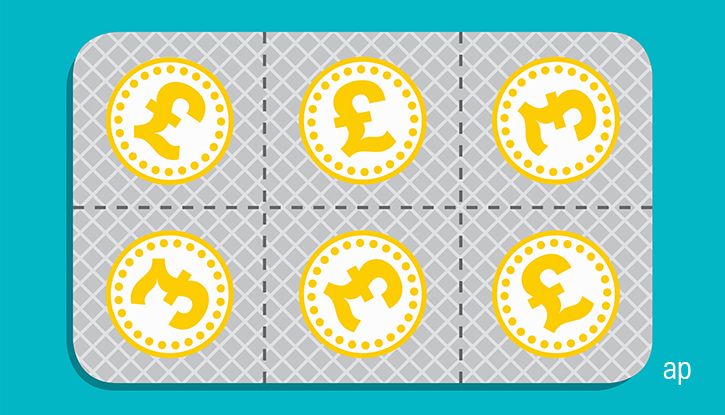
As part of our ISA special report week, we’re looking at income investing within the framework of tax-free saving – as well as the rules if you’re outside of this particular tax wrapper
The first quarter of 2024 is about to end and investors are looking ahead to the next earnings season and the potential benefits of interest rate cuts. Equity markets have had a strong start to the year, building on a decent 2023, as they look ahead to cheaper money after a period of monetary tightening.
But in the world of UK income there hasn’t exactly been a mood of wild celebration. In the most recent reporting season, of the 10 companies in our screen, four raised their payouts, while two held. Lloyds (LLOY), Schroders (SDR), GSK (GSK), Beazley (BEZ) and Reckitt (RKT) raised their dividends. WPP (WPP) and Unilever (ULVR) held theirs.
In reality, GSK and Schroders' increases were small. If dividend growth is your focus, there’s not much to get too excited about. And it would be fair to say companies are increasingly relying on share buybacks to pay shareholders – from Shell (SHEL) to Reckitt, UK stocks are spending billions buying back their own shares. Reckitt, a regular name on our monthly list, is still reeling from a $60 million award for damages from a US court over baby formula. Its shares are off 20% so far this year, but it just announced that its £1 billion buyback programme is about to enter its third phase in April.
Buybacks - Blessing or Curse?
We will look at share buybacks separately, but for now the debate over their merits continues. As a concept the buyback makes investors feel good and consolidates company control. But it could also be seen as a lazy way of propping up share prices when investors prefer cold, hard, dividend cash.
One counter argument comes from Joseph Hill, senior investment analyst, Hargreaves Lansdown:
“A dominant theme from our meetings with UK fund managers has been around the material boost that share buybacks are giving to the total shareholder yield,” Hill says.
“This total shareholder yield takes account of both the dividend a company pays out, but also the shares it buys back. At 6.1%, the UK market currently offers the highest total shareholder yield globally.”
And given the underperformance of UK income stocks over the last five years and the year to date - especially in the context of higher UK equity index levels - perhaps a mechanism for supporting share prices is not to be sniffed at?
Equity Risk for Dividend Stocks
The case of Reckitt reminds us that UK income stocks may be less exciting than say, the big artificial intelligence and technology names leading the charge in the US. But the former is still subject to the vicissitudes of the market. Textbooks call this “equity risk” but investors know this as “shares go down and up”.
If you'd put £2,000 in each stock on our screen at the start of the year, you'd be in the red for all but three of these.
Perhaps this doesn’t reflect how investors build portfolios in reality; your ISA may be a mixture of income shares, income funds, growth shares, or global investment trusts. Most equities pay some sort of income even if it’s not a big part of the investment appeal. And it’s rare that investors have the discipline to equal weight their portfolios regardless of performance and rebalance regularly – they often buy more of shares that have done well and sell the underperformers. My colleague Fernando Luque has look at the mechanics of putting together an income portfolio in this article.
Overall, the backdrop has not been favourable to UK income: domestic equities are unloved generally and Brexit and the pandemic have taken their toll on Britain’s appeal.
UK ISAs and UK Taxes: How do The Rules Work?
Whatever the wider market is doing – the FTSE 100 is flirting with a record high – the new tax year is always a key moment for UK investors; the 2024-2025 tax year is fast approaching and that means a refreshed £20,000 allowance opens up. This should allow an income-focused investor plenty of room to build a diversified portfolio.
To continue the example, if this portfolio paid a 5% yield – a realistic prospect – this would pay out £1,000 in income before fees. And that’s before potential share price gains (of which more later). An investor with £100,000 in income shares – this is just five years of ISA allowances rolled up – would collect £5,000 in tax-free income (that’s roughly half the state pension, which is paid gross).
Much is made of the “tax-free” side to ISAs. For dividend investors this can have a significant impact on the income they receive: payouts are received free of income tax, dividend, and capital gains tax.
Indeed, life outside of the ISA wrapper has been getting harder for income investors: for the last five tax years, the tax-free dividend allowance has been £2,000 but this dropped to £1,000 in the 2023-2024 tax year. And for the forthcoming tax year, this drops again to £500. A reminder: this allowance used to be 10 times higher in the 2017-2018 tax year. For a higher rate taxpayer investing for income who’s used up their ISA allowance, that doesn’t leave much tax free buffer.
How Are Dividends Taxed Outside an ISA?
Outside the ISA wrapper, dividends are taxed thus:
• Basic rate: 8.75%
• Higher rate: 33.75%
• Additional rate: 39.35%
And then there’s what’s know as “fiscal drag”.
The freezing of personal allowances to 2027-2028 is likely to pull more people into the higher and additional tax rates, which are much more punitive for income.
Similarly, another factor in favour of shielding your income shares in an ISA is capital gains tax (CGT). Most people don’t pay it and it’s not a well-understood levy. Everyone gets an allowance before having to pay CGT, but next week it will halve to £3,000 for the 2024-2025 tax year. As with the dividend tax changes, this reduction reduces the buffer for those who exceed their ISA allowance.
CGT may seem a remote concern for the average ISA investor. But over long periods returns can compound, making shielding from exposure more important over time.
“ISA millionaires” exist and they’re a staple of ISA season, showing just how powerful long-term saving can be. But for those unable to put aside their full allowance (or anything near that) ISA millionaire status can feel like a fantasy.
My colleague Ollie Smith has addressed this in his comment piece on the UK’s saving and investing marketplace. And there is another reason such savers may keep mum. Often, “ISA millionaires” may come across as smug or, worse, open themselves up to fraudsters, needy friends, and family members in a bind. Either way, HMRC will also be taking a keen interest, as ISAs are very much in play for inheritance tax. We’ll let you decide which is the worst outcome!
Inflation Changes - An Inflection Point for UK Income Stocks?
Last year I conducted this very exercise when I tried to ask myself searching questions about dividend portfolios. Interest rates are higher than when we last did this special week of ISA content (at 5.25% rather than 4.25%) but there have been dramatic changes in consumer price index (CPI) inflation, and in inflation expectations more generally.
With CPI at over 11% in October 2022, none of the names on our screen paid a yield above inflation – known in the business as “real yield”. Indeed, it would be unrealistic to expect companies to double their payouts in the high inflation era. And a share price weakness, which boosts yield, is undesirable anyway.
CPI not a great proxy for dividends and a volatile data set. But it’s easier than it has been for years to get a real return with an array of options, depending on your risk appetite: some cash ISAs pay 5%, while UK 10-year gilts yield just under 4%.
Let’s just say that investors don’t need to “reach for yield” anymore – not if they are trying to beat inflation, at least. Neither do they need to buy tobacco or oil stocks to get a decent payout.
Cash and Bonds Don't Grow
Our chart shows how equity income yield has looked attractive then suddenly very unattractive when inflation spiked. Are we at an inflection point now, where 3-4% yielders are now back in contention?
Unlike cash and gilt buyers, equity income investors can have more options because of dividend growth. Cash savings rates are likely to fall as interest rates are cut, while bond coupons are not going to increase either. The list of UK stocks that have increased their dividend every year for 10 years is small, and the dividend “aristocrats” with over 20 years of increases is a very select group indeed. One such stock is drinks maker Diageo (DGE), which has upped its payout every year since the 2000 financial year. The company is also undervalued, according to Morningstar analysts.
While the 2020 dividend crisis ended the records of some of the most reliable dividend stalwarts such as BT and Lloyds, some stocks have managed to maintain their winning streaks. One argument for investing in companies with such a long-term record is that they are reluctant to disappoint investors by cutting or holding payouts. Nevertheless, in times of crisis, such can be discarded quickly. In the current market, however, this seems unlikely.
Dividend Stock Screen Methodology
To make it on to our monthly list, FTSE 100 companies need now to have a Narrow or Wide Economic Moat, pay a dividend, and have a forward yield of 3% or more. This is now below the Bank of England base rate, which stands at 5.25% after March’s Monetary Policy Committee meeting. We changed our methodology last year, introducing a hurdle of 3%.
For the Morningstar Dividend Yield index: for the equity portion, Morningstar uses the forward dividend yield. For the fixed income portion, Morningstar uses the yield to maturity. If a manager does not supply a surveyed YTM value, then Morningstar will not calculate the TPY value.
































